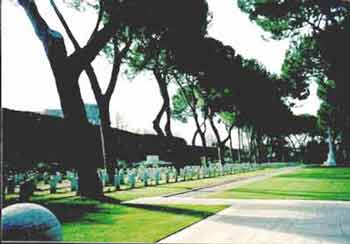War haiku - haibun

Rome British War Cemetery
Moussia Fantoli, Roma
It is a small garden not so far from Monte Testaccio, close to the ancient Roman walls.
Leaving the noisy road, across a gate, one enters a little round hall.
All over, on the top of the wall there are two dates and two inscriptions in Latin and in English:
1939 - 1945
Nos Britannico nomini adscripti communis salutis usque ad mortem vindices ut Italiae libertas et ambobus populis vetus amicitia redintegrata sit sepulti iacemus.
These soldiers of the British Commonwealth gave their lives to preserve liberty and by their sacrifice restored the freedom of Italy and the ancient friendship of the Italian and British peoples.
Rarely have I seen a more peaceful place.
Imagine a rectangular meadow with tall pine trees, roses, oleanders and small palms.
On the left, exactly under the Roman walls (Mura Aureliane), there are six rows of tombstones. They are all alike but they differ only for the sculpted symbols. Yellow daffodils, violets or roses are planted in front of each.
Behind the tombstones there is an altar, similar to a Roman one, with this inscription:
"Their name liveth for evermore"
On the basement of the altar there is another inscription:
"The land on which this cemetery stands is the gift of the Italian people for the perpetual resting place of the sailors, soldiers, airmen who are honoured here"
Near the altar, a huge, dark stone placed in the wall attracts the attention.
The written explanation of its presence is moving:
"This stone from Hadrians' wall the northernern most boundary of the ancient Roman empire was placed here at the wish of the citizens of Carlisle England in commemoration of the Cumbrian service men who died during the second world war."
Walking among the tombstones, I have read some of them:
Age 20
Always loving
always kind
beautiful
memories
left behind
Age 32
God's last gift
remembrance
Age 41
Memories light the darkest road
to that beautiful reunion
at the end of the road
Unknwon soldier
Known unto God
In front of the tombstones, in the middle of the cemetery, there is a white, marble cross upon which an iron sword is placed.
426 soldiers lie in this cemetery: 4 unknwon, 355 from Great Britain, 22 from Canada, 4 from Australia, 10 from New Zealand, 28 from South Africa, 2 from India, 1 from Mauritius islands, 2 from Palestina, 1 Pioneer Corps South Africa, 1 from West Indies.
Silence and birds own this place.
The city with its people is far away.
Time seems to be suspended and one may have the impression that one has received a task.
A moral obligation arises, thinking of all those men who rest here, killed by others who, perhaps, have been killed by others, and so on, in a kind of bloody chain.
The obligation to do our best to avoid other similar massacres for the future.
I believe that it is possible to avoid war as solution to the injustices, for instance breaking the causes of injustice.
I am sure that a different way of living, without selfishness, but with a sincere, helpful attention and respect for everybody (religion, race, political faith etc.) would give good results.
If we will renounce our privileged lifes to trouble about those who do not even own the right to survive, many of the potential sources of terrorism will no more be.
Lined under the grass
waiting for a voice
to call them again